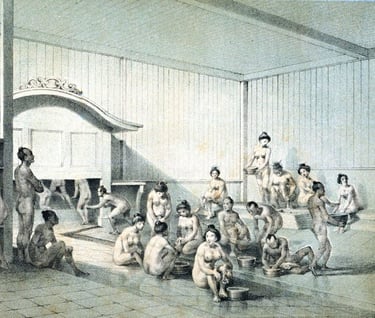Naturism in Japan
Could a country like Japan ever embrace naturism? Most would probably say “no!” After all, it’s a country in Asia, not Europe, and Asian cultures frown upon mixed gender nudity.
Yet I believe that most people are closet naturists, and that goes for a lot of Japanese. Most would be willing to try naturism under the right circumstances and situation. And to those who aren’t sure, it’s all about speaking their cultural language.
Now, to those reading this, you may either be Japanese yourself or have a Japanese friend or family member you want to introduce the lifestyle to, or both. Now, I admit I’m not Japanese, though I have tried to study the culture a great deal. That said, if you are Japanese yourself, maybe you have some suggestions that I don’t have when it comes to promoting naturism in your cultural language. If so, please educate me. You’re perspectives are most important.
That said, let’s look at the first way we can promote naturism to Japanese people.
Bathing
Coed bathing used to be the norm in Japan in both onsen and communal bathhouses. This was before the arrival of Commodore Matthew Perry’s ships and later western influence in the Meiji period. While a few mixed gender baths have held on over the years, as a whole such a practice from the Edo period died out in the hopes of winning western approval.
And yet the practice of communal bathing can be a great way to introduce naturism to those who aren’t sure. True, bathing is not naturism. It’s solely about cleanliness. Yet it might be able to open the doors to naturism, especially coed bathing, since naturism, generally speaking, is practiced among men and women. But how can it ease people into naturism?
Firstly, coed bathing can help take away the mystery of seeing strangers of the opposite sex nude, providing a healthy, wholesome, and controlled atmosphere. Single gender bath house behavioral rules are strict, and there is no reason they shouldn’t be in coed baths either. The Japanese already have some familiarity with mixed gender bathing, as families, parents and children, will bath together at home, a few even up to their teens with their parents. So it’s not like the nude opposite gender is a complete mystery.
Secondly, since public baths aren’t social, coed bathing could encourage strangers to have their personal space instead of dealing with the anxiety of talking to a naked stranger. This again, can get people comfortable to being naked with strangers of the opposite sex, as everyone is minding their own business.
Thirdly, onsens, or outdoor baths with springs, combine bathing with nature, with forest surrounding the bather or a mountain behind them. Again, not naturist related but still closer to embracing the precepts of naturism as it situates the bather out in nature, which is a core fundamental of naturism.
As previously stated, Japanese onsens and pubic baths in general are not naturist venues and nor are they meant to be, as they don’t encourage the social activities of the lifestyle. But they can open doors to naturism, especially if they are coed, as it can help people to further separate innocent nudity from deviant sexuality.
What if a coed bathhouse was to be introduced in Tokyo or Kyoto? Perhaps that’s asking too much. But what if there were more coed onsens out in the Japanese countryside? With a coed bathing event at an onsen, the bathers are practicing two precepts of naturism, the mixed nudity and being in beautiful nature, and all in a non-sexual, wholesome setting.
Art and Entertainment
Another way to open the door to naturism in Japan is talking about forms of art and entertainment. Entertainment, especially when it’s done in the forms of art, give us the ability to rethink how we see life. This can go for how we see innocent nudity.
Let’s start with anime and manga. While there is some heavily sexualized nudity in anime, not all nudity is so. Some anime and manga that uses nudity in a way that doesn’t equal fan service is Dragonball. There are plenty of scenes in the classic anime and manga in which young Goku skinny dips, sometimes in front of embarrassed company, without the least bit of shame. Then there is Sailor Moon, in which Usagi, the heroine of the anime, battles Galaxia nude.
Anime and manga aside, let’s take a look at the video game (yes, video games are an art form) Earthbound, known as Mother 2 in Japan. In this game in which a group of plucky young children must face a great evil, the lead character, a young boy named Ness, enters a dreamland called Magicant. In the original Japanese version, Ness is nude as he wonders this strange land of giant vegetables, talking bird men, and purple seas. In the western version, Ness was covered in pajamas.
What do all these three examples have in common, aside from the characters being nude? They represent purity! Goku lives in a world full of not so great people with impure motives. His purity, even as an 11 year old boy in the original Dragonball, is inspiring as, aside from having no shame swimming sans clothing, he can even see a nude woman without having the least bit of lust in his heart. As for Sailor Moon’s Usagi, as one internet user pointed out, her nudity shows her purity and her at her strongest form. Even Ness in Earthbound shows purity in his nude state. His nudity in Magicant is also representative of him finding the truth about himself. For is not the truth naked and unashamed?
Should we not want to emulate these role models, being comfortable in our own skin? Do we not want to be as pure as Goku, as strong as Usagi, and as truthful as Ness? Naturism can help motivate us to be the best, like these characters.
Cleanliness, Nature, and Respect
Japanese culture and the Shinto religion have a profound respect for cleanliness, nature, and respect.
First, let’s look at cleanliness. Shinto places great value on cleanliness. Each shinto shrine has a water basin with a ladle to cleanse your hands. That’s how serious about cleanliness they are. Within naturism there is a culture of cleanliness. We sit on towels instead of just placing our bare bottoms anywhere. Even resorts require people to shower and rinse before making use of the pool or hot tub. The American Association of Nude Recreation (AANR) states that “it is crucial to prioritize cleanliness and personal care to ensure a comfortable and respectful atmosphere for everyone.” In other words, the naturist values of cleanliness in naturism should align themselves with Japanese culture.
Next there is nature. Japan has a heavy respect for nature Living on an island almost the size of California with a large population. Throughout Japanese history, there was a belief in forest spirits, and there are still forest shrines. One of the practices in Japan is ‘Shinrin-Yoku,’ or, in English, ‘Forest Breath.’ It’s a type of meditation within forests, being mindful of nature and the beauty it offers. This is rejuvenating to the individual.
With all the spiritual and meditation encouraged in nature, imagine how much more it can be amplified nude. For are not human beings a part of nature, and is not the nude human nature in its pure and raw form?! Bereft of clothes, one is further clothed in nature, embraced by the wind, encircled lovingly by the water. The unclothed body is spiritual, like the trees, the rivers, and the mountains. Nudity encourages mindfulness, especially in natural settings. Of course, public decency laws must be followed. But maybe on someone’s private property with a garden it’s possible.
Last but not least, there is respect. Perhaps a Japanese person is worried about respect. Maybe their family or friends are worried about respect. Japan prides itself for being a nation of respect, and for the most part, they excel at it. Of course, there are some problems with women being groped on trains, and sometimes children face bullying. Well, good news! Naturism encourages respect!
In fact, naturism is anti-body shaming, which is a type of bullying. Making disparaging remarks about someone is against naturist culture. Likewise, naturist resorts and culture have zero tolerance for sexual harassment or groping of any kind. One strike and you’re out! So men, but especially women, should be able to feel safe at a naturist event. Naturists also frown upon photos being taken without permission. Harmony and respect are encouraged in a naturist setting. In this regard, it is similar to Japanese culture as disagreeable behavior is frowned upon.
Closing Thoughts
In closing, whether you are Japanese, or have Japanese friends and family, I hope this article has given you food for thought. Naturism, instead of being opposed to Japanese culture, can actually blend in perfectly with it. With the love of nature, and an appreciation for values, respect, and cleanliness, Japanese can fit into naturism like a hand in a glove, if naturists wore gloves.
Links and references:
https://www.bathclin.co.jp/en/happybath/did-you-know/a-brief-history-of-japanese-bathing-culture/


